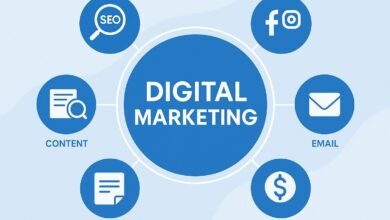Unlocking the Power of SEO for Fintech and B2B SaaS: A Comprehensive Guide

Introduction to Fintech and B2B SaaS SEO
The fintech and B2B SaaS industries have significantly evolved over the past decade, driven by technological advancements and changing consumer behaviors. Fintech, or financial technology, encompasses a wide range of companies that utilize technology to enhance or automate financial services. This includes payment processing, online banking, investment management, and blockchain technology, among others. On the other hand, B2B Software as a Service (SaaS) refers to software solutions that businesses access via the cloud, allowing for enhanced flexibility, lower costs, and easier scalability. Together, these sectors are not only transforming how businesses operate but are also creating new opportunities for growth.
In this competitive landscape, search engine optimization (SEO) plays an instrumental role in driving visibility and customer acquisition for businesses within these industries. The unique challenges faced by fintech and B2B SaaS companies require a tailored SEO strategy. For instance, rapid technological changes and regulatory considerations mean that these businesses must ensure their messaging is clear and compliant while also addressing user needs effectively. Moreover, the sophistication of their offerings requires highly targeted content that resonates with specific buyer personas.
Most customers in these sectors are increasingly reliant on search engines to find solutions that meet their requirements. Therefore, an effective SEO strategy becomes a cornerstone for success, enabling businesses to attain higher organic search rankings, drive website traffic, and convert leads into customers. Incorporating relevant keywords related to fintech SEO rankstar, SaaS SEO rankstar, and SEO for B2B rankstar can enhance visibility and authority in search results, ensuring ideal prospects can discover valuable services when they are needed most.
Understanding SEO: The Basics
Search Engine Optimization (SEO) is a crucial strategy for improving online visibility, particularly for businesses in the fintech and B2B SaaS sectors. At its core, SEO involves enhancing a website’s ranking on search engine results pages (SERPs) to attract more organic traffic. Fundamental to this process are several key concepts, including keywords, on-page optimization, backlinks, and user experience.
Keywords are the terms and phrases that potential customers use to search for information or services online. Identifying the right keywords is essential for creating content that resonates with your audience. For fintech firms, relevant keywords may include “fintech solutions,” “digital banking,” or “financial technology.” Similarly, for B2B SaaS companies, terms like “cloud-based software,” “enterprise solutions,” or “SaaS product management” might be employed. Conducting thorough keyword research is a pivotal first step in an effective SEO strategy.
On-page optimization refers to the practices used to improve individual web pages so they rank higher and earn more relevant traffic. This includes optimizing title tags, meta descriptions, headers, and content. Effective on-page strategies ensure that search engines easily understand your site’s content, which is especially important in competitive areas like fintech and B2B SaaS. Presenting valuable information that incorporates relevant keywords helps to improve SEO while also benefiting readers.
Backlinks, or inbound links, are links from other websites that point to your domain. These links are essential for enhancing your site’s authority and credibility. Building a robust backlink profile can significantly influence your SEO ranking. Engaging with industry influencers or contributing to reputable publications can be effective strategies to cultivate backlinks in the fintech and SaaS industries.
User experience (UX) is another vital component of SEO. A website that is easy to navigate, visually appealing, and quick to load will not only satisfy users but also positively impact search rankings. In the realm of fintech and B2B SaaS, creating a seamless and informative user experience can lead to higher engagement rates and conversions.
In summary, understanding the fundamental principles of SEO is essential for businesses aiming to improve their online presence, especially within the fintech and B2B SaaS sectors. By focusing on keywords, on-page optimization, backlinks, and user experience, companies can create a solid foundation for their SEO strategies that effectively enhances their visibility and growth potential.
Why Fintech Companies Need Tailored SEO Strategies
Fintech companies operate within a highly specialized and regulated environment, which necessitates the development of tailored SEO strategies to effectively reach their target audience. The unique nature of financial products often requires extensive explanation and context, making clarity and credibility crucial components of any digital marketing initiative. As such, SEO for fintech needs to be nuanced and comprehensive, ensuring that the content is both accessible and authoritative.
Regulatory considerations play a significant role in the operations of fintech companies. The financial industry is bound by a myriad of compliance and legal standards, which can affect how content is created and disseminated online. Search engines prioritize trustworthy content, which is paramount for fintech businesses seeking to build credibility with potential clients. Therefore, a focus on building high-quality backlinks and employing white-hat SEO practices is essential in fostering trustworthiness. A successful example of this is how a fintech startup in the lending industry improved its visibility by focusing on informative content tailored to regulatory guidelines, ultimately enhancing its seo for b2b rankstar and generating qualified leads.
Moreover, the complexity and specificity of financial products demand that fintech companies craft a personalized approach to their SEO strategies. By integrating terms relevant to their services, such as “ecommerce seo rankstar” or “fintech seo rankstar,” they can better capture the attention of search engines and potential customers. Additionally, providing clear comparisons, user scenarios, and comprehensive guides ensures that users can find the precise information they need, which reinforces the company’s position as a trusted source.
Ultimately, the integration of solid SEO strategies tailored to the fintech sector not only enhances visibility but also aligns with the industry’s demand for trust, compliance, and clarity in communication. As seen in successful case studies, a dedicated approach can result in significantly improved search engine rankings and greater user engagement, solidifying the importance of bespoke SEO in the competitive fintech marketplace. The path to success is paved with tailored strategies that address the distinctive challenges and opportunities faced by these companies.
Optimizing B2B SaaS SEO: Best Practices
In the competitive landscape of B2B SaaS, effective search engine optimization (SEO) is crucial for enhancing visibility and attracting potential customers. Understanding the buyer’s journey serves as a foundational element in this process. It is essential to map out the stages of awareness, consideration, and decision-making that your target audience undergoes. By creating content that resonates with users at each stage, businesses can effectively guide prospects toward making informed decisions.
Targeted content creation is a key component of successful B2B SaaS SEO strategies. Focusing on the needs and pain points of potential customers allows businesses to construct valuable resources such as blog posts, whitepapers, and case studies. These resources should not only provide insights but also demonstrate the unique value of the SaaS solution offered. For optimal reach, integrating relevant keywords such as “fintech SEO Rankstar” and “B2B SEO Rankstar” will improve search engine rankings without compromising content quality.
Long-tail keywords are particularly advantageous for optimizing B2B SaaS websites. These keywords, which consist of three or more words, tend to have lower competition and higher conversion rates. Incorporating phrases that reflect specific solutions or features can help attract a more targeted audience. Additionally, crafting a user-friendly site structure enhances both SEO and user experience, making navigation seamless. Utilize clear headings, a logical hierarchy, and mobile-responsive design to facilitate better engagement with prospects.
Ultimately, implementing these best practices will not only improve SEO performance but also drive expressions of genuine interest from potential customers. By focusing on the intricacies of the B2B buyer’s journey and creating content tailored to these stages, companies can effectively position themselves within a crowded marketplace and enhance their SaaS offers.
The Role of Content Marketing in Fintech and SaaS SEO
Content marketing plays a pivotal role in enhancing the SEO performance of both fintech and B2B SaaS companies. By producing high-quality, informative, and engaging content, organizations in these sectors can effectively build authority and establish themselves as thought leaders. This is particularly significant in industries characterized by complex products and competitive landscapes, where potential customers often seek clarity and validation before making decisions.
One of the most effective strategies for fintech and SaaS businesses is to maintain a robust blog that addresses industry trends, common pain points, and practical solutions. Regularly updated blogs can attract organic traffic, as they often answer specific queries related to financial technologies or software solutions. Utilizing targeted keywords such as “fintech SEO rankstar,” “SaaS SEO rankstar,” and “SEO for B2B rankstar” in relevant posts can significantly improve search visibility. It’s essential to blend these keywords naturally within the content to avoid keyword stuffing, thereby ensuring the content remains readable and engaging.
In addition to blogging, whitepapers and case studies serve as valuable tools for content marketing in these sectors. Whitepapers allow businesses to dive deep into specific issues or innovations within the fintech and SaaS realms, offering research-backed insights that can improve credibility. Meanwhile, case studies showcase real-world applications of a service or product, thus demonstrating efficacy and building trust with potential clients. Both formats not only cater to a more knowledgeable audience but also foster a deeper understanding of the unique value propositions these companies provide.
Finally, a well-crafted content marketing strategy can lead to improved link-building opportunities, as other websites may refer to the high-quality resources created. This results in enhanced domain authority, which is crucial for achieving higher rankings in search engine results pages. By strategically utilizing content marketing, fintech and B2B SaaS enterprises can significantly bolster their SEO efforts.
E-commerce SEO Strategies for Fintech and SaaS
The rapid expansion of e-commerce in the fintech and SaaS sectors necessitates the implementation of effective e-commerce SEO strategies to enhance online visibility and drive conversions. For businesses in these industries, focusing on product listings that are well-optimized is crucial. This includes incorporating high-quality images and detailed product descriptions, as well as utilizing schema markup to improve search engine understanding of the content. By implementing these practices, fintech companies and SaaS providers can ensure that their product offerings stand out in competitive markets.
Another essential strategy is the optimization for transactional keywords. These keywords typically indicate that the user is ready to make a purchase, presenting a significant opportunity for conversion. Utilizing tools like keyword planners will help identify the right transactional keywords relevant to your products and services. For instance, targeting phrases such as “best fintech solutions for small businesses” or “affordable SaaS tools for startups” can attract potential customers who are actively searching for options. This strategic focus will enhance the fintech SEO rankstar while improving visibility among the target audience.
Additionally, enhancing site navigability is paramount for improving user experience and retaining visitors. A well-structured site allows users to find the information they need quickly and intuitively, which can lead to higher conversion rates. Implementing a clear and logical navigation system, including well-defined categories for products and services, can facilitate a seamless experience for users. Furthermore, improving site speed and mobile responsiveness can also contribute to better SEO rankings and overall user satisfaction. By addressing these key aspects, businesses in the fintech and SaaS sectors will be well-positioned to leverage e-commerce SEO strategies effectively, thereby unlocking the full potential of their online presence.
Measuring SEO Success: Key Metrics and Tools
Measuring the success of SEO efforts for fintech and B2B SaaS companies is crucial for determining the effectiveness of digital marketing strategies. Several key metrics must be closely monitored to ascertain overall performance. A paramount metric is organic traffic, which assesses the volume of visitors arriving at a website through search engine results. This figure not only provides insight into the visibility of the site but can also indicate the effectiveness of SEO for B2B initiatives. Tracking tools such as Google Analytics can be instrumental in mapping out these trends, offering a comprehensive view of traffic sources and user behavior.
An equally important metric is the conversion rate. For fintech and SaaS enterprises, conversions often signify lead generation or sales. High conversion rates may suggest that the underlying SEO strategies effectively attract targeted traffic, which is essential for achieving business objectives. Utilizing tools like Google Optimize or HubSpot can help analyze conversion paths and identify opportunities for improvement, aligning marketing efforts with the user journey.
Keyword rankings are another critical indicator of SEO performance. Regularly monitoring rankings for targeted keywords such as “fintech SEO Rankstar” or “SaaS SEO Rankstar” can help companies evaluate their competitiveness in search engines. Tools like SEMrush or Ahrefs enable precise tracking of keyword performance, assisting businesses in adjusting their content strategies to align with evolving search trends.
Furthermore, incorporating analytics into the SEO framework is vital. Leveraging SEO tools allows companies to gather valuable insights into user engagement and content effectiveness. By combining metrics such as organic traffic, conversion rates, and keyword rankings, fintech and B2B SaaS companies can develop a holistic understanding of their SEO success, ensuring that strategies are aligned with broader business goals.
Future Trends in Fintech and SaaS SEO
The landscape of search engine optimization (SEO) is rapidly evolving, particularly in the fintech and B2B SaaS industries. As businesses navigate this dynamic environment, understanding emerging trends becomes crucial for staying competitive. One significant trend is the increasing influence of artificial intelligence (AI) and machine learning on search algorithms. Platforms like Google are leveraging advanced AI technologies to deliver more tailored search results based on user intent. For companies engaged in fintech and SaaS, optimizing content for these algorithms will mean focusing on user experience, relevance, and authority. This shift highlights the importance of utilizing SEO strategies that align with the evolving behaviors of search engines.
Another emerging trend is the growing prevalence of voice search. With the rise of virtual assistants such as Siri, Alexa, and Google Assistant, users are increasingly opting for voice queries over traditional text-based searches. This change emphasizes the need for businesses to adapt their keyword strategies and content optimization. For instance, incorporating more natural language and conversational phrases can greatly enhance the chances of appearing in voice search results. Companies within the fintech and SaaS sectors should optimize their SEO approaches to cater to this new search behavior, ensuring they remain visible to potential customers in an increasingly voice-driven digital landscape.
Additionally, the rising importance of video content cannot be overlooked. Video marketing has become a vital component of digital strategy, with a significant portion of online traffic coming from video platforms. For those involved in fintech and SaaS, creating engaging video content that elucidates complex concepts can enhance customer understanding and drive engagement. Integrating video into an overall SEO strategy can improve visibility and foster better communication with target audiences. Companies should thus explore innovative ways to utilize video, ensuring their fintech and SaaS offerings are effectively showcased in search results, ultimately enhancing their SEO rankstar.
Conclusion and Actionable Steps
In today’s competitive landscape, the implementation of effective SEO strategies is crucial for fintech and B2B SaaS companies aiming to improve their online visibility and engagement. Throughout this guide, we have explored various practices specifically tailored to enhance the SEO performance of these sectors. Companies must recognize that a solid foundation in SEO will not only elevate their search engine rankings but also drive qualified traffic to their websites, ultimately resulting in increased conversions.
To successfully bolster your fintech SEO efforts, start by identifying and researching your target audience. Understanding their needs and preferences will enable you to create tailored content that resonates with them. Incorporating relevant keywords such as “fintech SEO rankstar” and “B2B SaaS SEO rankstar” organically within this content can improve search visibility while ensuring readability. Additionally, utilizing schema markup can streamline the way search engines read and display your information.
Another actionable step is to optimize your website’s technical elements, including page speed, mobile responsiveness, and secure connections. These technical aspects are fundamental in ensuring a seamless user experience, which can impact your overall SEO performance positively. Moreover, consistently creating valuable content, such as informative blog posts and insightful resources, will not only foster trust with your audience but also establish your authority in the fintech and B2B SaaS domains.
Finally, don’t overlook the importance of link-building strategies. Engaging with industry influencers, participating in relevant forums, and earning backlinks from reputable sources are excellent ways to improve your website’s authority and search rankings. Engaging in these best practices will empower your company to harness the power of SEO effectively, thereby enhancing its growth potential in the competitive digital space.



